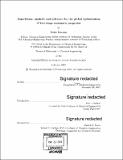| dc.contributor.advisor | Paul I. Barton. | en_US |
| dc.contributor.author | Kannan, Rohit | en_US |
| dc.contributor.other | Massachusetts Institute of Technology. Department of Chemical Engineering. | en_US |
| dc.date.accessioned | 2018-08-08T19:49:38Z | |
| dc.date.available | 2018-08-08T19:49:38Z | |
| dc.date.copyright | 2018 | en_US |
| dc.date.issued | 2018 | en_US |
| dc.identifier.uri | http://hdl.handle.net/1721.1/117326 | |
| dc.description | Thesis: Ph. D., Massachusetts Institute of Technology, Department of Chemical Engineering, 2018. | en_US |
| dc.description | Cataloged from PDF version of thesis. | en_US |
| dc.description | Includes bibliographical references (pages 315-331). | en_US |
| dc.description.abstract | Optimization models in the chemical process industries often include uncertain model parameters due to uncertainties in market forces and the environment, use of reduced-order and surrogate process models, and difficulty in measuring parameters accurately. Optimal solutions to formulations that simply ignore uncertainties in the model parameters can be economically worthless or even disastrous in safety-critical applications. Rigorously accounting for uncertainties in optimization models arising out of the process industries is usually computationally prohibitive because of their inherent nonconvex and combinatorial nature. This thesis develops branch-and-bound (B&B) algorithms and a software framework for the scalable solution of a rich class of optimization problems under parametric uncertainty called two-stage stochastic programs, which finds several applications within the petrochemical, pharmaceutical, and energy industries. Additionally, the convergence rates of broad classes of B&B algorithms for constrained optimization problems are analyzed to determine favorable characteristics of such algorithms that can help mitigate the cluster problem in constrained optimization. Two-stage stochastic programming formulations assume that a finite number of scenarios of the uncertain parameters may be realized, and provide a suitable framework for modeling applications with economic objectives. General-purpose B&B algorithms for two-stage stochastic programs suffer from a worst-case exponential increase in solution times with the number of scenarios, which makes the solution of practical applications impractical. This thesis presents a decomposable B&B algorithm for the efficient solution of large-scenario instances of a broad class of two-stage stochastic programs. Furthermore, this thesis details a software framework, named GOSSIP, that was developed for solving such problems. GOSSIP, which implements state-of-the-art decomposition techniques for the global solution of two stage stochastic programs, is shown to perform favorably on a diverse set of test problems from the process systems engineering literature, and is a step towards the efficient solution of two-stage stochastic programming applications from the chemical process industries. Branch-and-bound algorithms that do not possess good convergence properties suffer from the so-called cluster problem wherein a large number of boxes are visited in the vicinity of global optimizers. While the convergence rates of B&B algorithms for unconstrained problems and the cluster problem in unconstrained optimization had been well-studied prior to this thesis, the analyses for constrained problems were lacking, and are the focus of the second part of this thesis. This section of the thesis begins by developing a notion of convergence order for bounding schemes for B&B algorithms, establishes conditions under which first-order and second-order convergent bounding schemes may be sufficient to mitigate the cluster problem, and determines sufficient conditions for widely applicable bounding schemes to possess first-order and second-order convergence. In addition, this section analyzes the convergence orders of some reduced-space B&B algorithms in the literature and establishes that such algorithms may suffer from the cluster problem if domain reduction techniques are not employed. Determining sufficient conditions on the domain reduction techniques to be able to mitigate the above cluster problem can help identify efficient reduced-space B&B algorithms for solving two-stage stochastic programs. | en_US |
| dc.description.statementofresponsibility | by Rohit Kannan. | en_US |
| dc.format.extent | 331 pages | en_US |
| dc.language.iso | eng | en_US |
| dc.publisher | Massachusetts Institute of Technology | en_US |
| dc.rights | MIT theses are protected by copyright. They may be viewed, downloaded, or printed from this source but further reproduction or distribution in any format is prohibited without written permission. | en_US |
| dc.rights.uri | http://dspace.mit.edu/handle/1721.1/7582 | en_US |
| dc.subject | Chemical Engineering. | en_US |
| dc.title | Algorithms, analysis and software for the global optimization of two-stage stochastic programs | en_US |
| dc.type | Thesis | en_US |
| dc.description.degree | Ph. D. | en_US |
| dc.contributor.department | Massachusetts Institute of Technology. Department of Chemical Engineering | |
| dc.identifier.oclc | 1046678087 | en_US |
